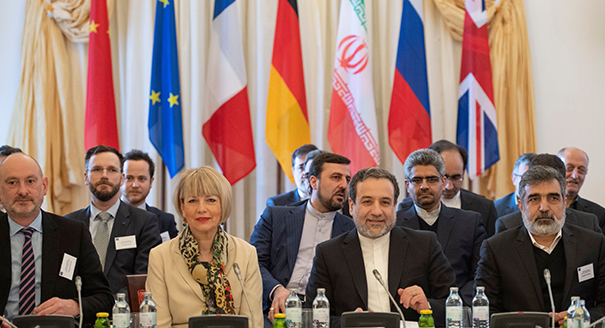Darioush Bayandor | Historian and former Iranian diplomat
The preservation of the Joint Comprehensive Plan of Action (JCPOA), the nuclear deal with Iran, as a linchpin of the non-proliferation regime has been a major European goal, vehemently pursued since the United States withdrew from the deal in May 2018. This same preoccupation underpins the decision, announced by France, Germany, and the United Kingdom (E3) on January 14, to invoke the dispute settlement provisions of the accord, in reaction to Iran’s methodical reduction of its uranium enrichment undertakings.
It is known that before this announcement, the E3 was under pressure from Washington to join the maximum pressure campaign against Iran. German Defense Minister Annegret Kramp-Karrenbauer even confirmed that the White House had threatened to impose a 25 percent tariff on European-made cars.
Still, imputing the E3 move to U.S. extortion is off the mark—a parallax error caused by the volatility of the political climate. From the standpoint of the E3 the triggering of the dispute resolution mechanism, foreseen in Articles 36 and 37 of the JCPOA, could create a space for dialogue with Iran that could lead to a face-saving solution for both Washington and Tehran. The pathway proposed in the two articles is in effect long and arduous, allowing time for an exhaustive exploration of ground for compromise.
What is the Iranian attitude to this? There are ultra-hardliners in the country who advocate full withdrawal from the nuclear deal and the International Atomic Energy Agency’s Additional Protocol. Yet, behind his rhetoric of defiance, Supreme Leader Ayatollah ‘Ali Khamenei remains a pragmatic politician. The aversion of President Donald Trump for war provides enough leeway for Tehran to blow hot and cold through its well-rehearsed practice of double talk, while awaiting the fate of Trump’s presidency in November.
Negar Mortazavi | Consultant editor for the Independent based in Washington, D.C., on Twitter @NegarMortazavi
The Europeans are in a difficult position and have few options ahead. The Trump administration has been threatening Europe with secondary sanctions and tariffs in order to pull them out of the Joint Comprehensive Plan of Action (JCPOA), the nuclear deal with Iran. And Tehran has been pressuring Europe to stand up to the United States and deliver promised economic benefits to save the deal. The Europeans have been trying to convince Tehran to stay in the deal and convince Washington to reduce pressure. Both attempts have failed.
Now the dispute mechanism seems to be their last resort in trying to convince Iran to comply with the JCPOA, while postponing further escalation by the Trump administration. Since President Donald Trump took the United States out of the JCPOA, Washington and Tehran have been on an increasingly dangerous collision course. Events of the past month have proven that the two sides can easily stumble into a military conflict, although neither wants a full-on war.
‘Ali Vaez | Director of the Iran Project at the International Crisis Group
While British, French, and German officials are at pains to claim that triggering the dispute resolution mechanism in the Joint Comprehensive Plan of Action (JCPOA), the nuclear deal with Iran, is not a first step toward reimposing United Nations sanctions, failure to resolve the dispute in the allotted time would make such an outcome increasingly inevitable. The United States seems keen to accelerate this outcome, which is the only way Washington can prevent the lifting of the UN arms embargo on Iran in October.
In other words, France, Germany, and the United Kingdom, known as the E3, now have a ticking bomb problem, which could spell the demise of the nuclear deal and maybe even Iran’s adherence to the Nuclear Non-Proliferation Treaty. That is unless they use the time and space the mechanism creates to find ways to provide Iran with a meaningful economic reprieve (with or without U.S. consent) and deescalate tensions in the region. If the Europeans end up killing the JCPOA in an effort to save it, they are no longer likely to play a role in future negotiations with Iran given the history of their engagement on this dossier for the past seventeen years and Iran’s belief that they are strategically irrelevant in the face of U.S. obstructionism.
Jarrett Blanc | Senior fellow in the Geoeconomics and Strategy Program at the Carnegie Endowment for International Peace.
Iran is in breach of its technical commitments under the Joint Comprehensive Plan of Action (JCPOA). That is not in dispute: Iran has announced each of its intended violations in advance and has permitted the International Atomic Energy Agency to continue its inspections, verifying each violation.
The Trump administration seems satisfied with a potential collapse of JCPOA restrictions on Iran. Tehran has, however, captured the attention of the United Kingdom, France, and Germany. The Europeans still prioritize restraining Iran’s nuclear program, but they have been unable to devise economic benefits for Iran that can be delivered in the teeth of U.S. sanctions.
Triggering the Dispute Resolution Mechanism (DRM) is a way of formalizing negotiations with Iran to roll back or at least slow Iran’s non-compliance. This is an effort to preserve at least a shell of the JCPOA that can be used as a platform for renewed diplomacy when both the United States and Iran are ready.
Triggering the DRM highlights Europe’s option—in extremis—of “snapping back” United Nations Security Council resolutions, which are suspended by the JCPOA, labeling Iran as a threat to “international peace and security” and sustaining UN limitations on arms sales with Iran, which are otherwise slated to expire in October 2020. Despite the current lack of economic benefits to Iran under the JCPOA, these are real costs that Tehran will need to weigh in considering how seriously to engage with DRM negotiations.








